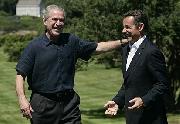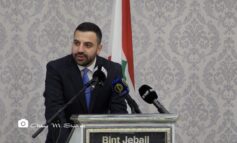Even if France were tempted to play guardian again for the Christians in Lebanon — with the approval of the American Empire, instead of the Ottoman Empire this time — the official Arab and international order could not directly imprint itself on Lebanon in a way favorable to the opposition, not even the Christian opposition, which makes up most of the Christian representatives in the Lebanese parliament. Reconciliation, from this perspective, means to tip the largely pre-opposition balance of power inside Lebanon towards the international position, and to adjust international balances of power in light of the domestic balance of power. If this cannot be achieved, there can be no reconciliation.
The attempt, with or without the mediation of the Security Council, to impose international power balances on parts of the world that do not conform with those balances has ignited powerful explosions whose destructive reverberations have not yet abated. Iraq and Palestine, which have imploded, are the latest casualties. The conflict currently raging inside Palestine is not a tale of “good guys” and “bad guys.” It is an episode in the bid to impose the pro-Israeli international balance of power on the Palestinians with the purpose of undoing the results of the last Palestinian elections (as these results were construed by Israel), regardless of the detriments of this ploy to international, Arab or Palestinian interests. It is also a case of local forces equally determined to turn around those election results, even if that means backing themselves with American and Israeli muscle. It is the story of the failure to complete the construction of a nation and to draw certain red lines, foremost among which is where foreign intervention in sovereign affairs should stop. The Lebanese sometimes caution others against meddling in their domestic affairs. But this has not stopped them from theorizing and meddling in the affairs of whomever they please through their media and in other ways. Nor has it stopped them from welcoming and even inviting foreign powers to come and tamper to their heart’s content. One look at the amazing train of Western ambassadors parading into Lebanon and their statements is sufficient to make that clear. All international dialogues on Lebanon (the most recent being between George W. Bush and Nicolas Sarkozy) are taking place between supporters of the current government in Beirut. The subject of their talks is whether to risk setting off another explosion in the region by imposing the international balance of power onto Lebanon or to engineer reconciliation between international and domestic balances of power until the opportunity presents itself to lash out at the Lebanese resistance and/or its regional supporters. The discussions are always about how and when to take on the resistance, never about its right to exist (that it shouldn’t is taken for granted). It would be hard for anyone to deny this. About a year or so ago, of course, certain parties in Lebanon talked about a strategic alliance with the resistance. Today they’re talking about getting rid of it through dialogue because sufficient force is not yet available, or by force when it becomes strong enough — say after America’s war on the resistance’s regional supporters. There’s nothing like honesty, as they say. How nice it is to hear someone say that he is proud to be part of America’s project for this region, as surprised as we might be at how wildly his positions have swung over the past two years. Still, this should not prevent us from responding, with equal frankness, “What is the American project in the region? As far as Lebanon is concerned, for example? To expunge the resistance, of course? And what about Palestine, honestly? To support Israel and Israel’s project of unconditional occupation? And the American project in Iraq? Duh … ” It’s alright, people, to be part of all this, and proud of it too, as long as you know that you’re part of a project that aims to destroy you. That project, so far, has a very brutal record of war and aggression, of the demolition of Iraq, of the use of internationally banned cluster bombs in Lebanon.”
This is why the question of the Lebanese presidency cannot be resolved outside the framework of national reconciliation that includes certain guarantees. Unless consensus over the presidency comes complete with agreement over essential matters, the consensus will serve only to gloss over other issues, leaving them unresolved until the enemies of resistance and their foreign allies with greater Middle Eastern agendas find the right time to solve them in their own notorious way. Since Syrian forces withdrew from Lebanon, the forces fighting American hegemony over Lebanon have been retreating step by step. This has encouraged forces allied with the U.S. to up the pressure on the opposition in order to gain additional ground. Perhaps it was this process, evidenced by events from the not so distant past, that inspired the American ambassador to act as high commissioner to Lebanon and to pronounce, a few weeks ago, his view that even if a president is elected in the absence of Lebanese reconciliation the opposition will fume and threaten as usual, but do nothing. Syria withdrew from Lebanon unilaterally without first having concluded an agreement to regulate the withdrawal process and its aftermath. Some interpreted this as a victory for one side in Lebanon and a defeat for the other. But even supposing that the Syrian presence had been an “occupation,” one would have presumed that the Syrian withdrawal and recognition of Lebanese sovereignty would have satisfied those who had retroactively labeled the Syrian presence an occupation and who would now be able to close the book on all those issues that they, again retroactively, termed “sacrifices in the struggle against the occupation.” In fact, Michel Aoun was the only Lebanese politician who regarded the Syrian presence as an occupation at the time the Lebanese invited the Syrians in. It is, therefore, not odd that he should be the only major Lebanese politician today to regard the Syrian withdrawal as the culmination of the struggle against the occupation and the beginning of a new chapter of normal relations with Syria. Aoun is the only major Lebanese politician who treats Syria as a separate state. As for the current ruling clique in Lebanon, which once acted as though it was part of the ruling forces in both Lebanon and Syria, it is now behaving as though it is part of the Syrian opposition, as though Syria is not a foreign state and had not been an occupying power that had withdrawn. To them, even the treaties that had been signed between the two countries in the past were no longer worth the paper they were written on. And instead of setting down on paper Lebanese promises for establishing the best possible special relationship with Syria after Syrian withdrawal, their criticism of Syrian practices in Lebanon escalated into flagrant hostility aimed at the heart of Damascus. They even demanded regime change, as though the nature of the Syrian regime were a domestic Lebanese matter. These forces that were now clamoring for blood had not only not regarded the Syrian presence in Lebanon as a foreign occupation, they had been part of the Syrian security order in Lebanon and they had even conceived the theoretical framework for that type of Syrian-Lebanese relationship. That is a far cry from occupation. Nor is that how the agents of an occupying power normally operate. Normally, agents of an occupying power do not broadcast themselves and they do not theorize. These are the same people who had complained whenever things did not go their way, even in Syria. It is not all that long ago when we heard them whine at the onslaught against Syrian leaders who had been their associates in power and helped them secure their leadership over the Lebanese factions. But that was before the assassination of Rafik al-Hariri. Afterwards, they went on the offensive and that offensive became increasingly vicious. They did not respect the borders between them and Syria. Nor did Syria respect these borders. Even though the forces that are currently ruling Lebanon could not have formed a government on the strength of the votes they won in the parliamentary elections alone, they act as if they had and their actions conflict with the campaign platform on the basis of which they were elected. They appropriated the electoral results just as Michel Aoun appropriated the opposition to Syrian presence and even the 14 March title. Although President Emile Lahoud has kept his distance, the cabinet has treated him as though he doesn’t exist at all and has effectively taken the decision it had its mind set on. Deafening its ears to the president’s cautions, the cabinet, alone, approved everything pertaining to the international court. Ministers who in Lebanese-Taif parlance were regarded as representative of a major faction in the government withdrew and joined the opposition. The people who remained in the cabinet shrugged their shoulders and kept on governing, despite the charge, based on the Taif Agreement and the constitution, that their government was now illegitimate. They grounded their insistence on staying in power upon what we might term the influence of the balance of international powers on the region. Not that this can be in any sense construed as international legitimacy, which has to do with relations between nations, not within them. After the Lebanese resistance heroically obstructed the obscene and savage Israeli assault on Lebanon, time came for the counterattack. This was led by forces that forged an opposition movement driven by its sense of patriotism and legitimacy and by its enormous sympathy for the resistance and its civilian population that suffered horribly during the war. At the same time, however, there was a dangerous development. Some Lebanese intellectuals, unable to shed their political and sectarian blindness, began to propound the notion that Israel had been the victim of Hizbullah aggression and was therefore justified in its assault against Lebanon and, by extension, in all its previous wars against the Arabs. Whether or not we call this pro-Israeli meddling in Arab affairs, when has Israel ever gone on the warpath without citing some justification or other? In 1948, it was the Arabs’ refusal of the U.N. partition plan. In 1956, it was the fedayeen attacks from Gaza. In 1967, it was the blockade of the Straits of Tiran. In 1982, it was the assassination attempt against Ambassador Argov. To accept Lebanon’s Israeli apologists’ logic is to acknowledge that the Arabs were the aggressors on all occasions. Surely Hizbullah’s capture of a couple of soldiers is a much feebler excuse for going to war than the blockage of a maritime passage. But we still call the 1967 war an act of Israeli aggression. The capture of a couple of Israeli soldiers as leverage for the release of Lebanese prisoners in Israel is not an act of war and not a justification for the horrifically destructive onslaught Israel unleashed against Lebanon. If, as some think, the Israeli aggression against Lebanon and the American justifications for supporting it were a form of colonialist intervention intended to resolve an internal Lebanese discussion by other means, then there were significant moments when the Lebanese opposition’s escalatory actions constituted a follow-through on its victory over that interventionist bid. Then this follow-through ground to a halt. Probably, in bringing their actions to a halt, opposition forces were acting out of a sense of responsibility. They probably wanted to forestall the type of situation that their adversaries would readily escalate into sectarian strife. Then the backwards slide began as the clique in power passed every measure it wanted. During this period, some prominent members of the 14 March group were assassinated. The ruling clique bore through this with boundless fortitude. In the face of the peril of assassination, one simply couldn’t ask them to change the people in power or argue with the security precautions they took to protect themselves. Yes, this clique paid a heavy price. But it acted on its own and gradually achieved everything it set out to accomplish, relying on the sense of responsibility of the opposition. But the presidency is another matter. It is a goal line, and in order to reach it both sides must take a step back so that they can work together to reach a point where they can converge upon an agreement over the identity of the president, the composition of the government (what triggered and sustained current protests was the question of the composition of the cabinet, not the question of the presidency) and a new electoral law. Unless such an agreement can be reached, everyone will be left wondering whether the ruling party will try to advance further, taking control over the presidency, the army and the government in order to ensure that the American project prevails in Lebanon. Is this the line from which there will be no retreat because the opposition has its back against the wall? After all, why should the stronger domestic party back off from the party it is determined to get rid of? Reconciliation in the sense described above offers an opportunity for all parties to risk a lacerating inspection of the seriousness of such options.
© Al-Ahram Weekly. All rights reserved.






Leave a Reply